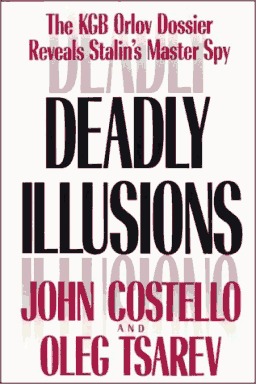the first book from the KGB archives
John Costello and Oleg Tsarev
Century, London, 1993
Yet another reheat of the interminable stew of Philby, Burgess, Blunt, Maclean et al, this time spiced up with material from the KGB archives. Yes, the KGB archives. Five years ago, unimaginable. Today… today it certainly makes a striking contrast with dear, declining Britain, where MP’s may not even ask parliamentary questions about MI5 and 6.
On the front cover is the legend “The KGB secrets the British government doesn’t want you to read’. I suspect that this also went on to the cover in the hope that the reader won’t notice that these are very much the KGB secrets the Russian government and KGB does want us to read. And no wonder. This is a story of how Soviet intelligence ran rings round the Brits.
If there are any secrets the British government is trying to keep buried here, I missed them. But I’m probably suffering from Secrecy Fatigue. Ever since Peter Wright’s Spycatcher every British publisher has tried to market spy books as “the book they tried to ban’. Alas, far from running the risk of breaking the Official Secrets Act, the only risk you run reading this book is the risk of falling asleep.
This curious alliance between a fairly right-wing historian and a former KGB officer, has produced partly a biography of a Soviet intelligence officer called Orlov, and partly the whole Cambridge “moles’ saga from the point of view of those who were recruiting and running them. The result is a heavy shower of new bits of information. So, for example, if you ever wondered how much the Soviet Union was paying Guy Burgess to spy in the 1930s, or how Philby’s Soviet superiors viewed his relationship with his father, to give two examples, the answer is here.
But now the Berlin Wall is down, does anybody care about this subject? The publishers evidently think so, for this book cost a lot to research and write, with hotel bills, expensive research and flights to and fro between Moscow, London and the United States. Who is reading this stuff? Well, there is a group of a few dozen Anglo-American scholars of espionage history, many of them witting or unwitting carriers of state propaganda — the “useful idiots’ of NATO. Apart from them, I have no idea.
